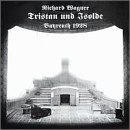| All Artists: Richard [Classical] Wagner, Karl Elmendorff, Bayreuth Festival Orchestra & Chorus, Anny Helm, Gunnar Graarud, Hans Beer, Ivar Andrésen, Joachim Sattler, Nanny Larsen-Todsen, Rudolf Bockelmann Title: Tristan and Isolde: Bayreuth 1928 Members Wishing: 0 Total Copies: 0 Label: Preiser Records Release Date: 2/22/2000 Genre: Classical Style: Opera & Classical Vocal Number of Discs: 2 SwapaCD Credits: 2 UPC: 717281903837 |
Search - Richard [Classical] Wagner, Karl Elmendorff, Bayreuth Festival Orchestra & Chorus :: Tristan and Isolde: Bayreuth 1928
 | Richard [Classical] Wagner, Karl Elmendorff, Bayreuth Festival Orchestra & Chorus Tristan and Isolde: Bayreuth 1928 Genre: Classical |
Larger Image |
CD Details |
CD ReviewsThe 1928 Bayreuth "Tristan" Ralph J. Steinberg | New York, NY United States | 04/06/2000 (5 out of 5 stars) "Let's get this album's main deficiency out of the way, first. It is a series of selected scenes, with Acts I and II almost complete, but a poor representation of Act III. That means the listener is deprived of almost all of Tristan's delerium. If it were not for this ruthless omission, this would be my desert island "Tristan." Although no longer in her prime, Larsen-Todsen is a far more impassioned and tender Isolde than Flagstad or Nilsson, and she actually becomes more vocally secure as the performance progresses. Graarud is a youthful, vulnerable Tristan, marred only by two instances of vocal strain. The hectic scheduling at Bayreuth did not leave time for multiple takes. Bockelmann is also imcomparable as Kurvenal, and Andressen shows both grief and fury as Marke. And Elmendorff is as eloquent a conductor of this music as Furtwaengler, and is backed up with the most beautiful and exciting playing from the Bayreuth orchestra. Preiser's transfer is as solid and clear as a mint set of the original 78's. Anyone who loves this work should purchase this set." Only if you're bored Erik Aleksander Moe | 07/16/2000 (3 out of 5 stars) "I had some curiosity and excitement about this set, but came away disappointed. First of all, Act III is severely truncated, and you miss nearly all of Tristan's agony-in my opinion one of the most beautiful parts of the opera. But aside from that, Larson-Todsen and Gaarud are truly from another era of Wagnenrian singing. They have very light voices, and deliver their parts in a flighty song-like way. This makes for its own lyricism, but it certaily is different. On the other hand the role of King Mark is sung in a full deep basso which makes the role actually interesting. Elmendorff's conducting sounds indifferent, at times boorish. The shepherd's reed (English horn) in Act III is played in staccato and provides zero mood to lead into Tristan's nonexistent delirium! I would recommed this set only if you are totally bored with Furrtwangler, Bohm, etc., and want to shell out thirty bucks for a historical curio from the Siegfried Wagner era at Bayreuth. The sound and transfer are actually quite good." A great document of the old tradition Erik Aleksander Moe | Oslo, Norway | 07/18/2001 (5 out of 5 stars) "This is performance with some unusual artists compared to what is normally heard today. We now today are used to sopranos with voices that have seemingly great power with not much beauty in the role of Isolde. The Isolde of this performance is something else. Nanny Larsen-Todsen has some of the most beautiful voices I have ever heard in German opera (along with Kirsten Flagstad). Hearing her singing Isolde's long monologue in act 1 is like listening to a bird singing. You are entranced with the beauty and you have to listen to her. In act 2 and 3 she also has great passion she knows how to deliver it without resorting to shouting. She also have some of the loviest transision between tones I have ever heard (also along with Flagstad). Flagstad may have more nobility and power in the performance, but Larsen-Todsen has the beauty to make up with it. Gunnar Graarud is a tenor of great power. His lower and middle register are under great control, delivering the words and notes magnificently. His high notes may not be too good, but considering many of the heroic tenors today, he is definitly some of the greatest Tristans ever. In the role of Brangaene is the great Anny Helm. She would later be a good Isolde herself, but it is quite unsual to cast a soperano that sounds younger than Isolde in the role. Rudolf Bockmann's portrayl as Kurnewal is also a treasure. One of the greatest bass-baritones of the century also delivers a great performance in his too short appearence. Ivar Andresen performs Marke with so much heart and nobility that one is declined to almost cry with him.Karl Elmendorff, one of the great Wagner conductors of the 20th centuary, is the real star in this magnificent performance. His pacing, balance, timing, phrasing are simply brilliant. Never overpowering the solists and yet being there at the correct power and accuracy at all times. It is thanks to him that the Bayreuth orchestra plays so beautifully.As for the sound. It is remarkable. Very little surface noice and yet high definition on the playing and singing.This performance is an excerpt recording. But the unfortunate thing is that most of Graarud's performance is not recorded. It is fortunate, however, to hear him with Larsen-Todsen in the drinking of the potion scene and the love duet. His performance of Tristan's delirium in almost non excisting here. Inspite of this, it definitly worth having."
|
